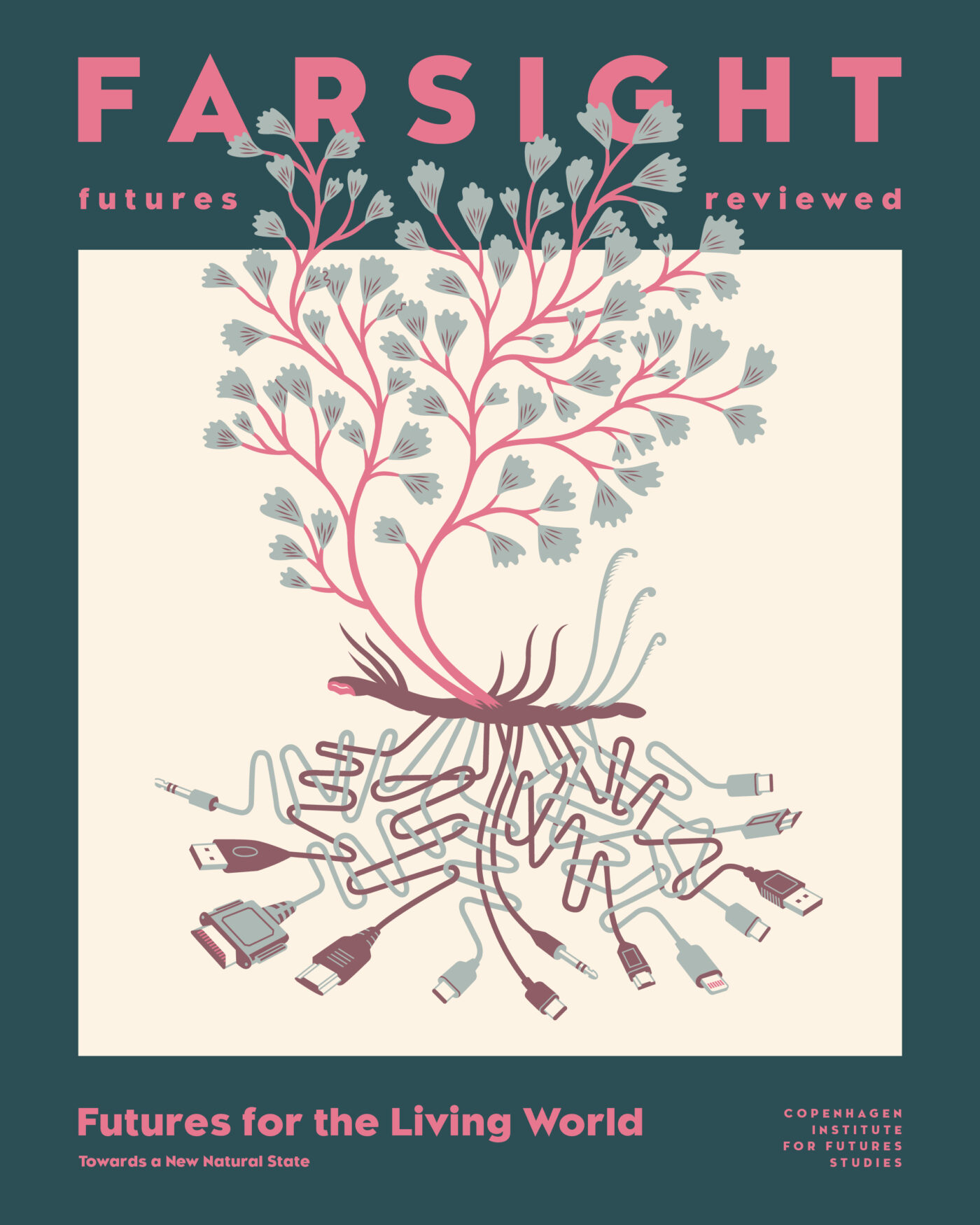
In turn, we use cookies to measure and obtain statistical data about the navigation of the users. You can configure and accept the use of the cookies, and modify your consent options, at any time.

“Mars is irrelevant to us now.
We should of course concentrate on maintaining the habitability of the Earth”
Kim Stanley Robinson is a best-selling American sci-fi author with a long history of writing fiction imagining climate futures, whether good or bad. Among his best-known novels are the Mars trilogy (Red Mars, Green Mars, and Blue Mars, 1992-1996), 2312 (2012) and New York 2140 (2017). His most recent novel is The Ministry for the Future (2020). The New Yorker has called him ‘our greatest political novelist’. He was a speaker at the COP26 climate change conference.
We met with Robinson in Copenhagen to discuss climate change, politics, literature, the human/nature divide, and humanity’s far off future.
You are a science fiction writer, not a climate scientist, yet you were a speaker at the 2021 UN Climate Change Conference (COP26) as well as at numerous other science conferences, and you have worked with the U.S. National Science Foundation. What can you contribute that the world’s foremost scientists cannot?
Three things: the future as subject for speculation; the syncretic combination of all the fields into a holistic vision of civilisation; and lastly, narrative as a mode of knowing. Actually, I think all scientific papers are narratives in much the same way short stories are, but they have different forms and different relations to their subject material, so that the narrative element (often quite similar to a detective story) is obscured. What science fiction can do is tell the human stories implied by scientific discoveries, and venture from descriptions of what is, to speculations about what ought to be (or what we ought to avoid).
To what extent do you believe climate fiction can influence political decisions today or make readers take active steps to mitigate climate change? What makes speculative fiction a powerful modelling exercise for climate futures, or futures in general?
People understand things through narratives, including the future. Everyone is the science fiction writer of their own life. When hoping for a good life, and thinking about what might bring that about, we are utopian writers; when fearful that bad things will happen, we are dystopian writers. So this is a very natural mode of thought.
When elaborated in detail, with thick texture and some lived imaginative time, a speculative fiction can bring to life in the mind one possibility or other, which can then be contemplated as a felt experience, and one’s present actions then adjusted accordingly, influenced by experiences that are fictional but nevertheless real.
In The Ministry for the Future (2020), you introduce the titular near-future organisation, which advocates for the world’s future generations of citizens as if their rights were as valid as those of present generations. Do you think such an organisation, if it existed in real life, could have an impact on climate policies greater than Greenpeace and other existing environmental organisations?
Yes. Greenpeace and the other existing environmental organisations are all admirable, but they work within the context of law and the current global capitalist order, trying to mitigate that order. A ministry for the future is a name, symbolic only, for a legal regime with the law behind it to enforce its actions. That would be different, and we need it. Really the ministry in my book is just a symbol for an entire suite of attitudes and legal regimes.
When discussing the impact of climate change, population growth and other longterm issues, we rarely look beyond 2100, which most policymakers consider the long view, yet you habitually do so in your books. Is taking the longer view at all an option in the current political and economic system? If not, what could be done to change this?
The discount rate that is applied routinely when making cost-benefit decisions in government and business is often set around 4%, following the world of William Nordhaus, and this discount rate is far too high. It could be set at zero, if we regarded future humans as the equal of ourselves; or if our calculations need some rate to avoid infinities in the results of the calculations, it could be set much lower. This would mean we were valuing future humans and the biosphere itself more highly.
That would be one technical, econometric, way of changing our attitude to the future. We could also pass laws protecting the biosphere, wild animals, and future humans as having rights the equal of ours and adjust behaviours and norms accordingly. This would be taking the long view. We see this in Wales’s ministry for the future, in the Children’s Trust, in Ecuador and New Zealand’s laws giving rights to landscape features and wild creatures, and so on.
The longer view is coming into human consciousness in part because of the radical danger of the immediate moment – which is that humanity might create a mass extinction event and wreck Earth’s biosphere for all the generations of humans to come, plus of course the many species that would be driven to extinction. That real possibility puts the shadow of a more distant future across the present.
What do you think it would take to achieve the 1.5 degrees Celsius target (or even a more manageable 2-degree target), given a not only a growing world population, but an even more rapid growth of the global middle class, with associated consumption patterns? Do you think it likely that we will manage to keep on target? What will the long-term consequences be if we don’t?
Clean energy and cleaner technologies in general would make a lot possible. World human population is not increasing as fast as it was, and may indeed start to decrease soon, for good reasons and bad. Creating adequacy for all is not impossible given the Earth’s productive powers and clean technology.
We are likely to shoot past the 1.5 temperature target, and after that we will probably try to take carbon back out of the atmosphere to cool things back down. That will be part of the coping work of the century to come.
In The Ministry for the Future, you examine geoengineering, specifically pumping seawater from the bottom of Antarctic glaciers to slow or prevent their sliding into the sea. Do you consider geoengineering a necessary toolbox for preventing devastating climate change? What do you see as the risks of geoengineering efforts?
Geoengineering is a vague term that has been demonised, so it is perhaps not useful to keep using it. Each action proposed has different costs, potential benefits, and potential dangers, so they need to be discussed individually and not as a class. Humans already do things at a scale that changes Earth’s biosphere, mostly in dangerously bad ways – CO2 in the atmosphere, ocean acidification, pollution of water and land, and so on – these are all geoengineering by accident. If we decide to do some things on purpose to try to save the situation, that is not a bad idea. We can’t claw back from certain processes by any geoengineering at all, so it’s not the central issue for discussion. What we can do, or might do, we should discuss.
You brought up the example of pumping meltwater out from under glaciers in the Antarctic to slow them back down to historic speeds. That would be good if it worked, and there are no dangers at all in trying it. It would cost billions, but if it worked it would save quadrillions. More importantly, civilisation would not break down – so using dollar numbers to rate these efforts is a little ridiculous; they could be existential, and thus shoot out of economic calculations into a different realm.
So all geoengineering ideas should be on the table for discussion, and we may need to try some before we are done. Decarbonising the atmosphere; ensuring women’s rights everywhere; these are both geoengineering methods, so the word is nearly useless as a category.
In your best-selling Mars trilogy, we follow the process of terraforming Mars (making it more suitable for human living) over two centuries while climate disasters devastate the Earth. Do you think that making Mars more habitable to humans is worth the effort, or should we rather concentrate on maintaining the habitability of the Earth? Or are both efforts necessary for humanity’s survival and wellbeing in the long term?
Mars is irrelevant to us now. We should of course concentrate on maintaining the habitability of the Earth. My Mars trilogy is a good novel but not a plan for this moment. If we were to create a sustainable civilisation here on Earth, with all Earth’s creatures prospering, then and only then would Mars become even the slightest bit interesting to us. It would be a kind of reward for our success – we could think of it in the way my novel thinks of it, as an interesting place worth exploring more. But until we have solved our problems here, Mars is just a distraction for a few escapists, and so worse than useless.
In your books, you often look for glimpses of the future in what already exists today. In 2312, you use the Mondragon Corporation found in the Basque region of Spain as a blueprint for a post-capitalist, cooperative interplanetary economy. Regarding nature and the climate, which existing phenomena or practices today do you see as potential indicators pointing towards a brighter future?
Mondragon still stands as a great example, because human justice is crucial for humanity solving our climate crisis. What I see also now is that rewilding and the various 30 by 30 movements (thirty percent of Earth’s surface given to the wild animals by the year 2030) are very encouraging efforts to cope with the poly-crisis of global warming by pollution of the air, and biodiversity loss by way of bad land management. Both elements are being addressed more and more.
Also, private capital is being invested in good green projects more and more. This is a hopeful sign of sanity on the part of capitalism’s powerful asset managers. Business goes poorly when the biosphere crashes and civilisation with it. This is so obvious that it is making for some changes. The sooner the better.
Climate change efforts basically seek to return the Earth’s climate to a 20th century state. Yet the planet’s climate has changed naturally over the last millions of years without human interference. Is it arrogant to try to preserve the Earth’s climate in a more-or-less static state, even if today’s climate changes are manmade rather than natural?
No, it is not arrogant. It’s a survival attempt. Earth’s climate does fluctuate a great deal due to natural changes, but what humans have done in the last 200 years equals millions of years of natural change, so we’re in a new experiment with no natural precedents. We may have initiated a new ‘hothouse Earth’ phase which in the past has meant no ice on the planet and sea levels 270 feet [80 m] higher than now.
Actually, this is a foolish question, I am going to stop answering it, it does not deserve an answer. I refer you to the IPCC reports, and request that you rethink such a foolish idea as that which is expressed in this question.
Do you have anything you want to add regarding nature and the future?
Nature and natural are words with particular weights that are perhaps not relevant now. We are part of a biosphere that sustains us. Half the DNA in your body is not human DNA, you are a biome like a swamp, with a particular balance or ecology that is hard to keep going – and indeed it will only go for a while after which it falls apart and you die. The world is your body, you breathe it, drink it, eat it, it lives inside you, and you only live and think because this community is doing well. So: nature? You are nature, nature is you. Natural is what happens. The word is useless as a divide, there is no Human apart from Nature, you have no thoughts or feelings without your body, and the Earth is your body, so please dispense with that dichotomy of human/nature, and attend to your own health, which is to say your biosphere’s health.

For more articles like this, read the issue FARSIGHT: Futures for the Living World